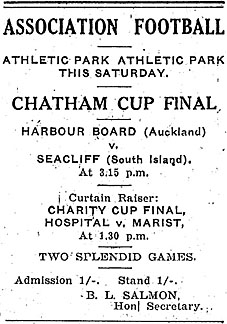Related Research Articles
The Chatham Cup is New Zealand's premier knockout tournament in men's association football. It is held annually, with the final contested in September. The current champions of the Chatham Cup are 2023 winners Christchurch United, who defeated Melville United AFC on penalties in the final.
Adrian Coroon Elrick was an association football player who represented New Zealand.
Michael McGarry was a successful association footballer who frequently represented New Zealand in the 1980s and 1990s.

Kenneth Armstrong was an English association footballer who represented both England and New Zealand at national level.
The 1923 Chatham Cup was the first annual nationwide football competition in New Zealand.

Seacliff AFC was a soccer club based in the Otago region of New Zealand's South Island. They are notable for being the first team to win the Chatham Cup competition. They contested the final on later occasions in 1924, 1925, and 1929. Many of the team came from the staff of the Seacliff Lunatic Asylum; with the demise of the hospital in the 1940s, the team went into hiatus.

The 1924 Chatham Cup was the second annual nationwide knockout football competition in New Zealand.
The 1925 Chatham Cup was the third annual nationwide knockout football competition in New Zealand.
The 1926 Chatham Cup was the fourth annual nationwide knockout football competition in New Zealand.
The 1929 Chatham Cup was the seventh annual nationwide knockout football competition in New Zealand.
Charles Ballard was an association football player who represented New Zealand, playing in New Zealand's first ever official international.
Charles Steele Jr. was an association football player who represented New Zealand at international level.
Tom McNab is a former association football player who represented New Zealand at international level.
George Murray Kay was an association football player who represented New Zealand at international level.
Geordie Newman is a former association football player who represented New Zealand at international level.
Henry George Spencer, known as Harry Spencer (1897–1942) was a football player who represented New Zealand at the international level.
William George Hooper was an association football player who represented New Zealand at international level.
Andrew Leslie was a former association football player who represented New Zealand at international level.

Moturoa AFC is one of New Zealand's oldest association football clubs. Based in New Plymouth, the club traces its establishment back to the Watersiders Association Football Club.
The Ranfurly Shield, colloquially known as the Log o' Wood, is perhaps the most prestigious trophy in New Zealand's domestic rugby union competition. First played for in 1904, the Ranfurly Shield is based on a challenge system, rather than a league or knockout competition as with most football trophies. The holding union must defend the Shield in challenge matches, and if a challenger defeats them, they become the new holder of the Shield. Hawke's Bay were the most successful team during this period with 24 successful defences which was, at that stage, a record.
References
- ↑ "A-International Appearances - Overall". The Ultimate New Zealand Soccer Website. Archived from the original on 1 May 2009. Retrieved 24 October 2009.
- ↑ "A-International Lineups". The Ultimate New Zealand Soccer Website. Retrieved 24 September 2009.
- ↑ "The Story of the first ever Chatham Cup final 100 years ago". Friends of Football. 10 September 2023. Retrieved 12 October 2023.
- ↑ "Association football : CHATHAM CUP FINAL". The Dominion. 29 September 1924. Retrieved 12 August 2023– via Papers Past.
- ↑ "CHATHAM CUP TO WELLINGTON". Evening Post. 21 September 1925. Retrieved 12 August 2023– via Papers Past.
- ↑ "THE CHATHAM CUP FINAL". NZ Truth. 29 August 1929. Retrieved 12 August 2023– via Papers Past.